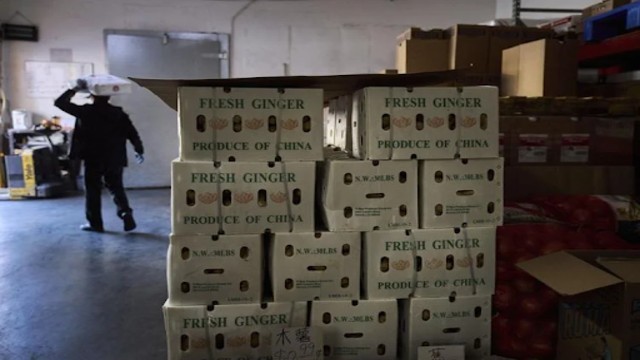
Boxes of ginger from China are stacked at a grocery market in the Chinatown neighborhood of Los Angeles, Friday, April 11, 2025. (AP Photo)
Chinese exporters are on edge as a sweeping tariff war with the United States threatens long-standing trade relationships. What started as a manageable burden for some businesses has now escalated into a full-blown crisis, prompting many to pause shipments and rethink strategies.
Initial Tariffs Manageable, But Not Anymore
Zou Guoqing, a seasoned Chinese exporter from Ningbo, initially weathered the first rounds of 10% tariffs imposed by former U.S. President Donald Trump. He offered price cuts to his American clients to soften the impact. It worked—temporarily. His Nebraska-based client placed another order.
However, things changed drastically when Trump raised tariffs by 34% in April, followed by additional hikes that brought the total to 145%. Zou was stunned. “There’s not a thread of feasibility,” he said. “We are pausing the shipments until the leaders talk.”
Retaliation and Rising Uncertainty due to Tariff War
China hit back with a 125% retaliatory tariff, and businesses on both sides now face mounting uncertainty. Exporters are unsure about future orders, and experts warn of long-term damage.
“If the tariffs stay for more than six months, we might see a real economic decoupling between China and the U.S.,” said Chen Zhiwu, a finance professor in Hong Kong.
Josh Lipsky from the Atlantic Council likened the current situation to a “trade embargo.” He added that U.S. firms may be forced to find alternatives to China, especially for low-cost goods like apparel.
Selective Exemptions Offer Little Relief
While the Trump administration has exempted electronics such as smartphones and laptops from the 145% tariffs, it does little to ease the burden for most exporters. Analysts say the exemption shows a realization that moving tech production back to the U.S. isn’t practical in the short term.
China’s tariff office was blunt in its response, stating there was “no possibility for market acceptance” of U.S. goods under the current tariff levels.
Waiting in Limbo
“There’s no clear way forward,” said Hu Jianlong of Brands Factory, a consultancy that helps Chinese companies go global. “We’re all waiting to see what happens.”
Trade tensions come two decades after China joined the World Trade Organization with U.S. support, sparking a trade boom. Last year alone, China-U.S. trade hit $582 billion. But frustrations over China’s trade surplus and rising exports like electric vehicles have reignited the conflict.
A Shift in U.S. Strategy
Under President Joe Biden, the U.S. has focused on “de-risking” instead of full decoupling. Biden’s administration introduced strict controls in sensitive sectors like AI and chip manufacturing. Now, Trump is back with universal tariffs—yet also open to dialogue.
But analysts like Greta Peisch, former general counsel for the U.S. Trade Representative, remain uncertain about Trump’s true goals. “We don’t know what he really wants in return,” she said.
Chinese Businesses Explore Plan B
With no high-level talks scheduled, exporters are hedging their bets. Lisa Li, who works for an athletic wear firm in Hebei, said they are negotiating cost-sharing with U.S. clients while also exploring new markets like Australia and Europe.
Others aren’t as hopeful. A Wenzhou-based holiday lights maker said he’d likely have to give up on the U.S. altogether. “Europe has been in a slump. The U.S. was our chance.”
Danny Lau, an aluminum factory owner in Dongguan, said some U.S. clients are staying—for now—but future deals remain uncertain.
Supply Chain Shake-Up Already Underway
At the Shanghai port, shipping to the U.S. has plummeted. Shipping companies are cutting back on trans-Pacific routes.
Consultant Hu said the tariff war may accelerate supply chain diversification. Some Chinese firms might even relocate part of their operations overseas, including to the U.S.
For others, like a steelmaker in Tianjin, the decision has already been made—they’re out of the U.S. market for good.
Hope Amid the Tariff War Turmoil
Yet for some, optimism remains. Zou, the veteran exporter, is not ready to abandon the U.S. just yet. “It’s the best market on Earth,” he said. “I am waiting for the rainbow after the storm.”















